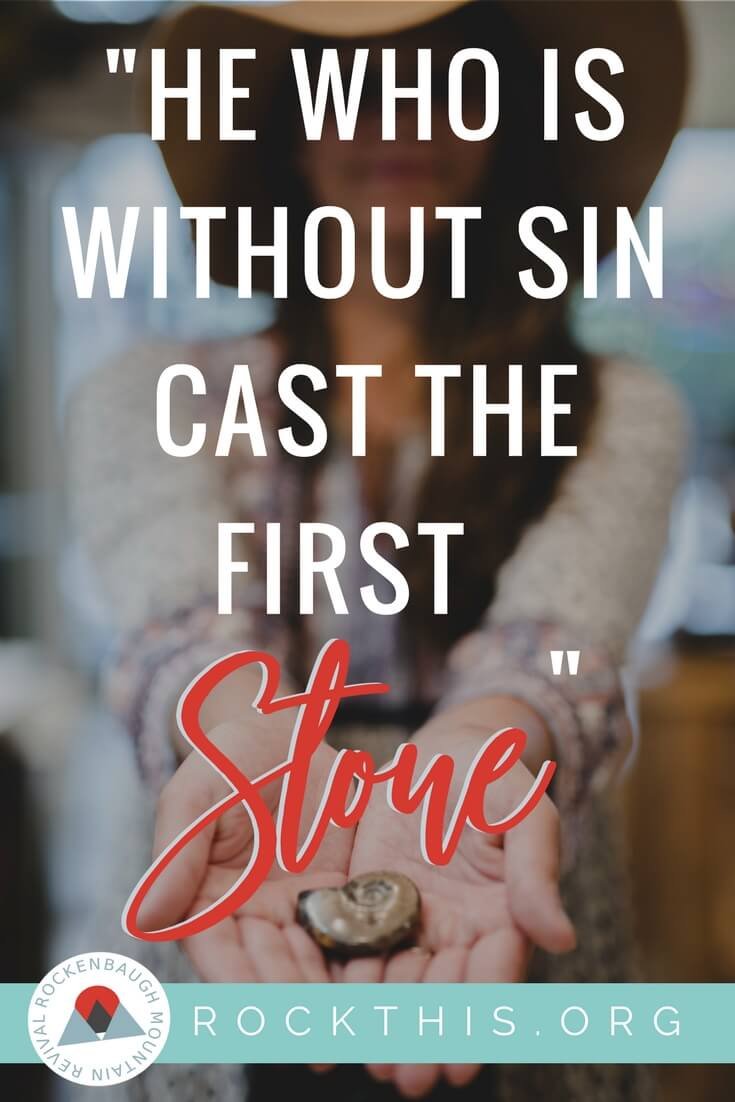He Who Is Without Sin Cast the First Stone
Reading and understanding Scripture can be hard.
Christians and non-Christians alike frequently refer to this passage. Dare I say it is one of the most commonly misused and misapplied verses today?
Let's take a look at John 8:1-11
What is this passage really teaching us? What truth are we to learn?
"but Jesus went to the Mount of Olives.
At dawn he appeared again in the temple courts, where all the people gathered around him, and he sat down to teach them. The teachers of the law and the Pharisees brought in a woman caught in adultery. They made her stand before the group and said to Jesus, “Teacher, this woman was caught in the act of adultery. In the Law Moses commanded us to stone such women. Now what do you say?” They were using this question as a trap, in order to have a basis for accusing him.
But Jesus bent down and started to write on the ground with his finger. When they kept on questioning him, he straightened up and said to them, “Let any one of you who is without sin be the first to throw a stone at her.” 8 Again he stooped down and wrote on the ground.
At this, those who heard began to go away one at a time, the older ones first, until only Jesus was left, with the woman still standing there. 10 Jesus straightened up and asked her, “Woman, where are they? Has no one condemned you?”
“No one, sir,” she said.
Then neither do I condemn you,” Jesus declared. “Go now and leave your life of sin.”
First and foremost we have to look at the context and history of the time to truly understand this passage.
What was the motivation of the accusers?
Mosaic law required both the woman AND the man to be given the same punishment. The Pharisees were not in compliance with the law in which they were attempting to use by only bring the woman to Jesus.
While it may initially appear the Pharisees brought the woman caught in adultery to Jesus for justice, a quick look at verse 6, and we see that is not the case.
"They were trying to trap him into saying something they could use against him, but Jesus stooped down and wrote in the dust with his finger."
These men who brought the woman to Jesus were desperately trying to trap Jesus in an attempt to "legally" kill Him... not the woman. She was simply a means to an end.
TAKEAWAY:
It's important to examine our own motives when we're addressing others. Are we twisting the "law" in an attempt to condemn someone else? Are we pure-hearted in what we're doing?
Let's look at Jesus' response to the accusers.
“All right, but let the one who has never sinned throw the first stone!”
If you pluck this verse from the Bible without looking at the verses before and after, it's easy to misunderstand.
Is Jesus saying that we must not judge an action as sin? Are we being judgmental if we call sin, sin?
No!
Jesus was in no way condoning the woman's behavior. (We'll examine that more thoroughly in the next point.)
Jesus was telling the accusers they were:
a.) Not in compliance with the law they were attempting to get Him to administer (they only brought the woman and not the man), and
b.) According to Jewish law, the witness to the crime had to participate in the punishment. Hence why Jesus asked them about picking up the stone.
In their attempt to trap Jesus, they had trapped themselves.
They knew the Law, but they knew Jesus was right in His response.
Notice something interesting in the following verses?
"Then he stooped down again and wrote in the dust. When the accusers heard this, they slipped away one by one, beginning with the oldest, until only Jesus was left in the middle of the crowd with the woman." (8-9)
Wouldn't you love to know what Jesus wrote in the dust?
That's my flesh talking... Obviously, if we needed to know what He wrote, God would have included it.
What we do know, though, is that the accusers left... the oldest first. Whatever Jesus wrote in the sand pricked the conscience of the men that day.
TAKEAWAY:
When we knowingly twist God's word or law for our gain, He will never fall for it. His is perfect justice, and our meager attempts will never change that. Thankfully, He will prick our conscience to draw us back to repentance which leads to right relationship.
Now let's look at Jesus' response to the woman.
"Then Jesus stood up again and said to the woman, “Where are your accusers? Didn’t even one of them condemn you?”
“No, Lord,” she said.
And Jesus said, “Neither do I."
Notice the word Jesus uses is condemned.
Condemned in this context means a judicial sentence to a particular punishment, i.e. death. (Remember that the Pharisees were attempting to use Mosaic law against her.)
So essentially Jesus was telling the woman that He was not condemning her to death for her sin of adultery.
Let's now look at His parting words to her:
"Go now and leave your life of sin.”
Was Jesus being judgmental by calling adultery sin?
Absolutely not.
This is where it's easy to get it wrong. Recognizing and calling a sinful behavior sin does NOT equal judgment. Condemning someone for their sin EQUALS judgment.
TAKEAWAY:
Jesus loved this woman so much, He couldn't leave her where He found her. He doesn't leave us either. His goal for her and us is to draw us to repentance. Notice a pattern here? God wants us to be in right relationship. The sin in our lives impedes that relationship.
It is vehemently important that we be in God's Word and spend the time researching the context of Scripture so that we will better understand God's truth. Our truth doesn't matter.... only God's truth matters.











Abby Rike has a heart for helping Christian women grow in their faith. She believes there is no better way to strengthen your faith than to get in the Word of God. Her passion is to equip women to read the Bible for themselves and experience the transformation that comes from experiencing God. She has created a Bible study method that meets you where you are in your faith journey and helps you get where you want to go.